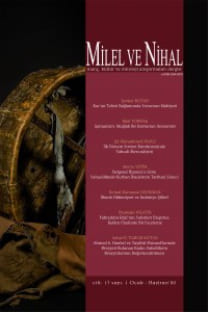Religion and Education in New Millennium Macedonia
Günümüzün birçok açıdan en hararetli tartışma konularından biri olan din eğitimi üzerine Makedonya Cumhuriyeti’nde yaşanan temel sorun; dersin devlet okul sisteminde yer alması noktasında belirginleşmektedir. Öyle ki geçtiğimiz on yıllarda din derslerinin okullarda verilmesi amacıyla pek çok başarısız girişimde bulunulmuş; ancak Anayasa Mahkemesi tarafından devletin sekülerist yapısını korumak adına söz konusu ders iki defa ders programlarından çıkartılmıştır. Fakat bahsedilen mahkeme kararı da din eğitiminin ders programlarındaki yeri hakkındaki tartışmalara son verememiştir. Çalışmada, din eğitiminin sosyalleşme sürecinde etkin rol oynayan araçlardan bir tanesi olduğu kabulünden yola çıkılmış ve konu birbiriyle bağlantılı olarak karşılaştırmalı, kurumsal ve yerel bakış açıları şeklinde nitelenebilecek üç açıdan ele alınmıştır. Bu bağlamda öncelikle Avrupa’da ve özellikle de Balkanlarda din eğitimine ilişkin yaşanan farklı tecrübelere dair yapılan analizin ardından Makedonya’nın din eğitimi konusundaki yaklaşımı ele alınmıştır. Çalışmanın son bölümünde ise Tetova ve Gostivar bölgelerinde 400 kişi ile gerçekleştirilen araştırmanın sonuçları sunulmuştur. Böylelikle öğrenciler, öğretmenler ve ailelerden oluşan bir yerel örneklemden hareketle halkın konu hakkındaki düşüncelerine yer verilmeye çalışılmıştır.
Anahtar Kelimeler:
Sekülerizm, eğitim, din eğitimi, din kültürü, Makedonya Cumhuriyeti
Religion and Education in New Millennium Macedonia
Religious education is one of hotly debated discussion topics of our time in many ways. In the context of the Republic of Macedonia the main issue related to religious education appears to be the incorporation of this subject into the public school system. Several futile attempts for introducing religious classes in the schools have been made during the last decades. The Constitutional Court has even abrogated the course twice from the curricula on the grounds of protecting state’s secularism. However, it didn’t bring an end to the discussion on the place of religious education in the curricula. Based on the assumption that religious education is one of the main tools of effective socialization, this paper deals with the issue through three interrelated aspects, i. e. comparative, institutional and local. Firstly, an analysis on different experiences in Europe, particularly in the Balkans, in religious education will be provided. After introducing the situation in various European states the paper will focus on the peculiarities of religious education in Macedonia. In the last chapter of the paper the results of the survey, conducted with 400 respondents from Tetovo and Gostivar, will be presented. By doing so, it is aimed to show the attitude of students, teachers and parents on the matter from a local perspective.
Keywords:
secularism, education, religious education, religious culture, Republic of Macedonia,
___
- BERGER, Peter L., ‚A Market Model for the Analysis of Ecumenicity‛, in Social Research, 30, 1963.
- BYRNES, Timothy A. & Peter J. Katzenstein, Religion in an Expanding Eu- rope, Cambridge University Press, 2006.
- KAUFMANN, Eric, ‚Breeding for God‛, Prospect Magazine, No. 128, De- cember 2006.
- ‚Господ пет години тропа во школските порти‛, http://star.dnevnik. com.mk/default.aspx?pbroj=2805&stID=58526/14.01.2012
- GÖKSEL, Ayla, ‚Religion and schooling in open society‛, folk.uio.no/leirvik/ OsloCoalition/AnnexCJulyVersion. doc (20.10.2011). Хелсиншки Комитет за Човекови Права на Република МАкедонија, годишен извештај, 2009.
- Kozhuharov, Valentin, ‚Relations between Church and state in establishing RE at public schools in Bulgaria and Rusia‛, www.iccsweb.orgenglish- praha_2011downloadsroundtable_valentin (29.11.2011).
- KRASNIQI, Milazim, Suksesi i garantuar, Zëri Ynë, Pristina, 2006.
- KUBURIĆ Zorica & MOE, Christian, Religion and Pluralism in Education: Comparative Approaches in the Western Balkans, CEIR & Kotor Net- work, Novi Sad, 2006.
- KUBURIĆ, Zorica & Sladjana Zuković, Verska nastava u školi, Novi Sad, 2010.
- MATEVSKI, Zoran, The religious education in the pedagogical system in the Republic of Macedonia, kotor-network.info/papers/2005/Macedonia. Mat- evski.htm/29.05.2012
- McGUIRE, Meredith, Religion: The Social Context, fifth edition, Wadsworth Thomson Learning, Belmont (USA), 2002.
- MUSTAFA, Avzi, ‚Arsimi fetar në sistemin shkollorë‛, http://www.forumi shqiptar.com/shoëpost.php?p=2062754&postcount=36 (04.04.2010).
- PAJAZITI, Ali, Kultura dhe cilësia e jetesës: Rasti Maqedoni, Logos-A, Skopje, 2011.
- PAJAZITI, Ali, ‚Mësimbesimi: Sfidë e shoqërisë post tranzicionale‛, www.alipajaziti.net/29.05.2012
- PAJAZITI, Ali, Mësimi fetar në Maqedoni: Mes kërkesës shoqërore dhe sfidave ligjore, Dituria, Vol. 3, No. 5.
- PEPIN, Luce, Teaching about religions in europian schools sistems: Policy issues and trends, Alliance Publishing Trust, London, 2009.
- Plan i program vjerskog odgoja i obrazovanja, Glasnik Ministarstva prosvjete i kulture Republike Hrvatske.
- Parlamenti i Kosovës: Jo futjes së edukatës fetare në shkolla‛ http://www. voanews.com/albanian/news/Alb-Kosove-edukata-fetare- parlamenti-2011-08-29-128592048.html
- RAMADANI, Naser, Trajnimi i arsimtarëve në lëndën ‘Etika e religjioneve’, prezantim, Byroja për Zhvillimin e Arsimit, Skopje, 06.12.2010.
- Slavejko Sasajkovski, Revitalizacija na op¡estvenata funkcija na religijata- politicko soocuva˙e so religiskiot fenomen, ISPPI, doctoral dissertation, Skopje, 1998.
- SHASIVARI, , ‛Vendim joevropian‛, Zaman, May, 2009, No. 41.
- SHUSHNJIQ, Gjuro, Fuqia dhe pafuqia e shkencës në kritikën e religjionit, Penda, Prizren, 2000.
- TASHI, Jonida, ‚Lëndë fetare në shkolla, Tafaj pranon kërkesën e klerikëve‛, MAPO, 27.04.2012.
- ТИМОВСКИ, Владо, Образованието и религијата, Feniks, Skopje, 2005.
- Toledo guiding principles on teaching about religions and beliefs in public schools, OSCE/ODIHR, Warsaw, 2007.
- ISSN: 1304-5482
- Yayın Aralığı: Yılda 2 Sayı
- Başlangıç: 2003
- Yayıncı: Milel ve Nihal: Eğitim, Kültür ve Düşünce Platformu Derneği
Sayıdaki Diğer Makaleler
Religion and Education in New Millennium Macedonia
Makedonya’da Bulgar ve Latin Kilisesinin Gelişimi (Tunalı Hilmi’nin Makedonya Risalesi)
Në fillimet e nacionalizmit shqiptar-Lindja e një kombi me shumicë myslimane në Evrope
Nathalie Clayer, Në fillimet e nacionalizmit shqiptar-Lindja
